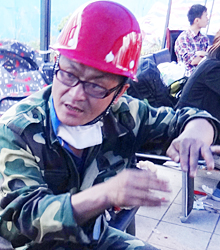|
 |
|
HELPING HANDS: Peng Jie discusses a service plan at a temporary shelter for earthquake survivors in Lushan County on April 22 (LI FANGFANG) |
"Please help me donate my corneas if I cannot come back," volunteer Peng Jie, 44, texted his friend at 1:58 p.m. on April 20 when he was on the way to Lushan County in Ya'an City, southwest China's Sichuan Province. A 7.0-magnitude earthquake hit Lushan at 8:02 a.m. that day, which had left at least 196 people dead and 21 missing as of April 24.
Immediately after hearing the news, Peng quit his job as a wedding photographer in Tianjin and booked a flight to Chengdu, the capital of Sichuan, some 2,000 km away from the northern metropolis where he resides.
Peng arrived in Chengdu around 3 a.m. on April 21, and took a taxi to Ya'an. Non-rescue vehicles were prohibited on the main route to Lushan. Aftershocks caused intermittent mudslides on provincial road 210, bottlenecking vehicles carrying relief supplies.
Peng continued on foot with four other volunteers he had met on the plane. Five hours and 30 km later, he arrived in Lushan to join 500 volunteers at a temporary shelter for people affected by the quake.
Dealing with loss
"I'm not an expert in psychology, but I deeply understand the feeling of losing everything," Peng told Beijing Review.
The Wenchuan earthquake in Sichuan on May 12, 2008 left an indelible mark on Peng's life. The 8.0-magnitude quake destroyed all nine of his photography studios in Mianzhu. Peng went from business owner to practically nothing in an instant.
"I don't want to talk about the disaster any more," said Peng, with tears filling his eyes. But what he has done over the past five years is closely connected with that experience.
After the Wenchuan earthquake, Peng joined a team of warm-hearted people to financially assist students from disaster-affected families and donated at least 2,000 yuan ($324) annually. The number of recipients of their assistance exceeded 200 in 2012.
Lushan is the sixth disaster zone Peng has volunteered to help as a rescue worker. Previously, he helped at the site of a devastating mudslide in Zhugqu, northwest China's Gansu Province in August 2010, and comforted people affected by a 5.8-magnitude earthquake in Yingjiang, southwest China's Yunnan Province, in March 2011.
Twist of fate
Unexpectedly, Peng found a familiar face among his fellow volunteers at Lushan: a young man he had helped years ago in Wenchuan.
Liu Jicheng, 19, is a university student in Ya'an and, like Peng, a survivor of the Wenchuan earthquake. Peng had kept contact with Liu's family after the quake, doing his best to help the boy persevere despite tragedy.
The most important and difficult thing is to help survivors alleviate the shock of the disaster and move on. "My solution is to believe in the country and warm-hearted people when I feel depressed," Peng said. He remarked that a tender gesture such as a touch on the hand or shoulder is encouraging to those in need.
Peng told the survivors that tents, food, water and other necessities were being shipped in, but their delivery would take some time and they should trust the government.
"Survivors are very likely to feel helpless and disappointed about the government's rescue and relief efforts soon after a disaster," he said. "It is important to rebuild their confidence in the government and face reality."
Every time Peng left for a disaster zone for rescue mission, he would be prepared. He registered at the Mianzhu Red Cross Society to donate his corneas in 2011.
"Love is mutual. Giving is its own comfort," he said.
(Reporting from Lushan County, Sichuan Province) | 